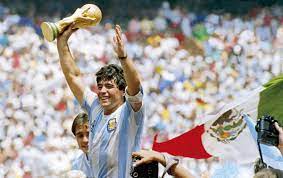Diego Maradona, widely regarded as one of the greatest football players of all time, left an indelible mark on the sport with his unparalleled skill, charisma, and controversial moments. Born on October 30, 1960, in Lanús, Argentina, Maradona’s journey from the streets of Buenos Aires to the pinnacle of football stardom is the stuff of legend.
Maradona’s career reached its zenith during the 1986 FIFA World Cup in Mexico, where he led Argentina to victory. His extraordinary talent was encapsulated in the infamous “Hand of God” goal against England, where he punched the ball into the net, and the sublime solo effort against the same opponent in the same match, often referred to as the “Goal of the Century.”
Beyond the World Cup triumph, Maradona’s club career included successful stints with Boca Juniors and Napoli. He transformed Napoli, a club from southern Italy, into a footballing powerhouse, guiding them to two Serie A titles and a UEFA Cup. His impact on Napoli was so profound that the city remains eternally grateful, with a mural of Maradona adorning the streets.
However, Maradona’s life was not without its share of controversies. His battles with drug addiction and tumultuous personal life often overshadowed his on-field exploits. Despite the controversies, Maradona’s influence extended far beyond the pitch. His magnetic personality, resilience, and ability to inspire made him a global icon.
Tragically, Diego Maradona passed away on November 25, 2020, leaving behind a legacy that transcends the game itself. The outpouring of grief from football fans worldwide underscored the impact he had on the sport and its enthusiasts. Maradona’s life serves as a testament to the complexities of fame, the highs and lows of a legendary career, and the enduring spirit of a footballing maestro.



Recent Comments